Interviewer: We have the honor of speaking with members of the Husseini family, who have been entrusted with the custody of the key to the Holy Sepulcher in Jerusalem for centuries. We are in the Old City of Jerusalem to learn more about this unique tradition.
The eyes of the Christian world turn to the Church of the Holy Sepulcher in Jerusalem, where the tomb of Jesus Christ is located, especially on Holy Saturday, which precedes Easter Sunday. This place is visited by many pilgrims from all over the world, both believers and non-believers.
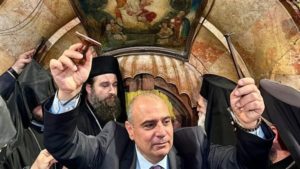
Mr. Adeeb Joudeh Alhusseini, Church of the Holy Sepulchre, Jerusalem
To begin with, could you explain to us the origins of this tradition that bestows on your families the custody of the key to the Holy Sepulcher?
Adeeb Joudeh Alhusseini of the Husseini Family: Our family is part of the oldest Sunni Muslim dynasty in Jerusalem, with origins dating back to the time of the Prophet Muhammad, in the VII century.
Following an agreement reached among all the Christian churches that the keys of the basilica would be given to the Joudeh Alhusseini family, our family was appointed custodian of the Holy Sepulcher in 1187, more than 800 years ago, and approximately 623 years before the present Edicule was built. Saladin, one of the greatest rulers of the Islamic world, gave us the key to the Holy Sepulcher. Since then, we have passed on this responsibility from generation to generation.
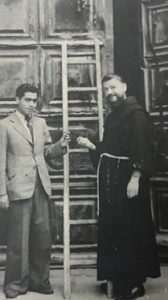
His father, Jawad Joudeh Alhusseinu, in 1946 during Maundy Thursday

Adeeb Joudeh Alhusseini and his son, June 2024.
How is the custody and daily handling of the key organized?
Mr. Adeeb Joudeh Alhusseini: Every day, a representative of our family goes to the Basilica around four o’clock in the morning to bring the key. He then returns punctually – at half past seven in the winter and an hour later in the summer months – to pick it up and take it home.
The Nuseibeh Family is in charge of opening and closing the grand door. This task is done jointly with the Alhusseini. The key, which measures 20 centimeters, is the only one that opens the large wooden door of the Basilica of the Holy Sepulcher.
What is the significance of this tradition for you and for the community in general?
Mr. Adeeb: For us, this tradition is a symbol of coexistence and mutual respect. The fact that a Muslim family holds the key to one of Christianity’s holiest sites is a powerful example of tolerance and interfaith collaboration.
It is also a great responsibility and honor for the Alhusseini family. It reminds us daily of the importance of maintaining peace and harmony in a city as diverse as Jerusalem.
How do you experience the daily ritual of opening and closing the Basilica?
Mr. Adeeb: This ritual is more than just a routine; it is a moment of connection and historical continuity. Every day at dawn, when the door opens, we reaffirm our intention to keep alive this tradition of cooperation and respect.
It is an act witnessed by pilgrims and visitors from all over the world. They see in this ritual a tangible manifestation of peaceful coexistence and mutual respect between different faith communities.
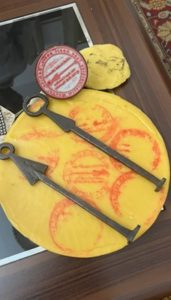
Keys and seal of the Holy Sepulcher, June 2024
What is the legacy you hope to leave behind with this tradition?
Mr. Adeeb: We hope that this tradition will continue to be a beacon of hope and unity for future generations. We want cooperation and mutual respect to remain possible, even in times and places of great diversity and challenges.
The relationship between us is based on brotherhood, love and respect. In Jerusalem, Muslims and Christians are united and live together in peace and tranquility without difference.
During the present conflict, people find themselves compelled to come closer to God, and to pray and plead with God to stop this fierce war; and for that the doors of the Church are always open.
The present, sad circumstances do not affect the usual opening ritual, but during the war, arrivals, visitors and pilgrims have been cut off, so the church found itself lacking any foreign visitors. Only local residents have been constantly present in the Church of the Holy Sepulcher.
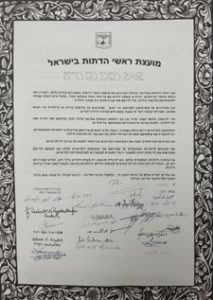
Council of Religious Leaders – agreement for peace, respect and understanding among all Religions, according to the teachings of the Great Creator.
I want to highlight that this legacy of shared stewardship between the Alhusseini Family and the Nuseibeh family not only honors the history of Jerusalem, but also provides a model for the world on how communities can live together in peace and respect. I always dream of being able to see with my own eyes the moment when Christians, Muslims and Jews are praying together, as a whole group, in front of our God.
Thank you for sharing your story and for keeping this important tradition alive.
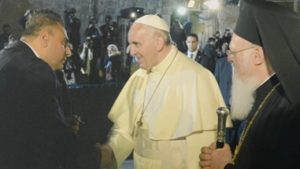
Adeeb Joudeh Alhusseini and pope Francis, Jerusalem 2014
In the heart of the Old City of Jerusalem, the collaboration between the Husseini and Nuseibeh families remains a symbol of coexistence and interfaith respect, showing that peace and harmony are possible in a diverse world. God bless the Alhusseini Family and Nuseibeh Families.
